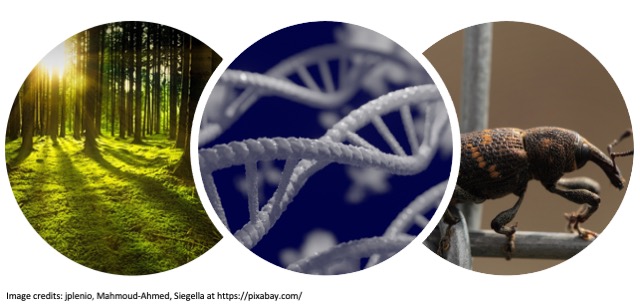Project Description
The relentless destruction of forest habitats coupled with the impacts of climate change are causing a decline in biodiversity. Recent reports have raised concerns about a rapid decrease in arthropod diversity (1). Arthropods play a crucial role in virtually all ecological processes that govern ecosystem functionality (2), serving as primary and secondary consumers in food chains. They perform essential roles including biomass transformation, decomposition, nutrient cycling, facilitating pollination and seed dispersal. The complexity of arthropod interactions is further compounded by the presence of predators, parasitoids and invasive arthropods that compete for resources, regulate food webs and can cause tree-damage. Understanding the complex interactions within arthropod assemblages can enhance our understanding of ecosystem services; inform forest management initiatives and potentially influence policy decisions contributing to our understanding of ecosystem services. However, conducting large-scale surveys to acquire this knowledge is prohibitively expensive and labour-intensive.
The increased accessibility to DNA sequencing has revealed the potential of DNA-based surveys to transform the field of environmental sciences. These approaches can be tailored to capture a wide range of taxa, from broad categories to very specific groups. Depending on the sampling method, they can even detect species that are transitory, short-lived, or invasive that traditional survey methods may overlook. However, despite these recent technological advancements, harnessing the potential of DNA-based monitoring to address crucial environmental issues remains a challenge. In terms of bioinformatics, there have been significant advancements in methods for identifying taxa present in DNA samples. Nevertheless, some of the most significant obstacles include the lack of reference sequences for species identification, the potential for incorrect taxonomic assignment and the absence of standardised methods.
This project will harness the potential of high-throughput sequencing technologies to assess arthropod diversity and species assemblages using a metabarcoding approach (3). The project will integrate traditional arthropod sampling methods for forest canopies, taxonomy, DNA barcoding techniques, species identification from bulk-DNA and bioinformatics to build a reference species database for Northern Ireland. The species identified from the bulk-DNA will provide essential data for constructing species interactions and species co-occurrence models and facilitate the identification of “sentinel” species whose abundance serves as an indicator of ecosystem health. Furthermore, the methods and databases developed in this project will be applied in collaboration with our partners at AFBI for future arthropod biodiversity assessments in commercial Northern Irish forests.
The supervisory team will provide support and training in evolutionary ecology, population ecology, and techniques in genetics, bioinformatics, statistical analysis, and ecological modelling. The student will have the opportunity to receive training in field sampling and gain experience of potential policy applications through a 3-month internship with project partners at AFBI. As part of a community of doctoral students with a shared interest in environmental management, biodiversity, and earth systems science, the successful applicant will have access to outstanding scientific resources and receive training in advanced sequencing technologies and the latest molecular and environmental tools.
CANDIDATE BACKGROUND
We are looking for a student with a degree in biology, ecology or computational biology/bioinformatics. As the project will be primarily computational with some elements of field work and molecular techniques, some experience in molecular biology or computational techniques (as applied to metabarcoding) will be keenly considered.
Image credits: jplenio, Mahmoud-Ahmed, Siegella on Pixabay
Supervisors
Karen Siu TingPrimary Supervisor: | Profile: Karen Siu Ting Email: K.SiuTing@qub.ac.uk Institution: Queen's University, Belfast Department/School: School of Biological Sciences |
Alex DouglasSecondary Supervisor: | Profile: Alex Douglas Email: a.douglas@abdn.ac.uk Institution: University of Aberdeen Department/School: School of Biological Sciences |
Sarah HelyarAdditional Supervisor: | Profile: Sarah Helyar Email: s.helyar@qub.ac.uk Institution: Queen's University, Belfast Department/School: School of Biological Sciences |
Additional Supervisor: | Dr. Neil Warnock & Dr. Florentine Spaans, AFBI |
References
1 Sánchez-Bayo, Francisco, and Kris AG Wyckhuys. “Worldwide decline of the entomofauna: A review of its drivers.” Biological conservation 232 (2019): 8-27.
2 Hébert, Christian. “Forest Arthropod Diversity.” Forest Entomology and Pathology: Volume 1: Entomology. Cham: Springer International Publishing, 2023. 45-90.
3 Creedy, Thomas J., Wui Shen Ng, and Alfried P. Vogler. “Toward accurate species‐level metabarcoding of arthropod communities from the tropical forest canopy.” Ecology and evolution 9.6 (2019): 3105-3116.
QUADRAT Themes
- biodiversity
- environmental-management
Partners
CASE Partnership with Agri-Food and Biosciences Institute
A CASE Partnership project is delivered in collaboration with an industry partner. The CASE partner organisation contributes finance, expertise, facilities and an internship.






















































